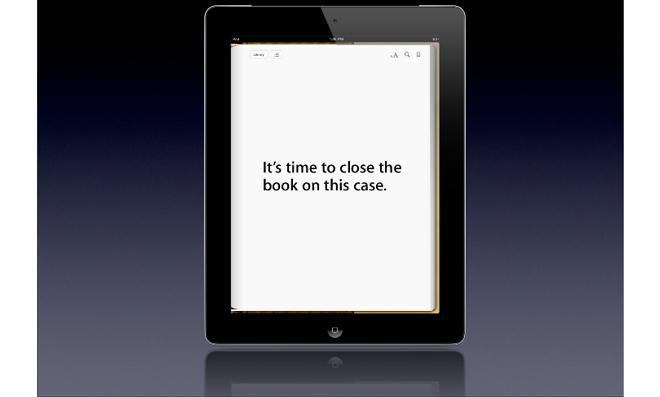In a court filing on Wednesday, five major U.S. book publishers objected to the penalties proposed by the Department of Justice against Apple's e-book business, saying the program would change the terms of their respective settlements with the government.
The publishing houses argue that the DOJ's proposed five-year ban on Apple's so-called "agency model" deals would negatively impact defendants which settled the e-book antitrust case, reports The Wall Street Journal. HarperCollins, Hachette, Simon & Schuster, Penguin Group and Macmillan all settled prior to the Justice Department's trial.
"The provisions do not impose any limitation on Apple's pricing behavior at all; rather, under the guise of punishing Apple, they effectively punish the settling defendants by prohibiting agreements with Apple using an agency model," the documents read.
Apple was found guilty of e-book price fixing in July, with the U.S. government saying the company colluded with book publishers to falsely inflate the price of content sold through the iBookstore. Most of the trial centered around agency model pricing, which allows book publishers to set their own prices under a most-favored nations clause that precludes them from selling the same content elsewhere for less.
Under the terms of a proposed settlement from the DOJ, Apple would not be allowed to enter into agency model agreements for five years. This, the book publishers say, hurts Apple less than it does the parties that settled.
For its part, Apple called the proposal a "draconian and punitive intrusion" on its iBookstore business and plans to appeal the ruling.
Confusing the situation further, the proposed settlement also suggests that Apple be prohibited from entering similar agreements with sellers of "music, movies, television shows or other content that are likely to increase the prices at which Apple's competitors may sell that content." This would extend the proposal's scope far beyond the iBookstore.
 Mikey Campbell
Mikey Campbell







-m.jpg)






 Brian Patterson
Brian Patterson
 Charles Martin
Charles Martin


 Malcolm Owen
Malcolm Owen
 William Gallagher
William Gallagher
 Christine McKee
Christine McKee
 Marko Zivkovic
Marko Zivkovic









81 Comments
ah ha... the plot thicken here... you can kind of read between the lines of what the publishers agreed to.
It appears existing wholesale contract with Amazon has been placed on the clock and there is a limit that expires sometime in the near future.
give it to em boys.
the Amazon influencing media in DC (literally buying the Washington Post) is sickening too.
the Amazon purchasing media in DC (literally buying the Washington Post) is sickening too.
Why is it sickening? Amazon did not purchase Washington Post.
Why is it sickening? Amazon did not purchase Washington Post.
whatever. if you wanna do this do this hair splitting BS, its really up to you. The fact of the matter is connected to politics in DC and the DoJ actions. dodge it if you want... its clear that Amazon is using politics to their advantage of Apple.
If the case is thrown out on appeal ... well, that will be the end of that.
I still don't understand how Apple can be accused of "price fixing" when [I]they don't even set prices to begin with[/I]... the publishers set the prices in that agency model. And I also don't understand how this helps anyone except Amazon who was artificially steering prices lower to prevent fair competition. I hope the DOJ gets a scolding from the President like the ITC recently did. It is certainly deserved.